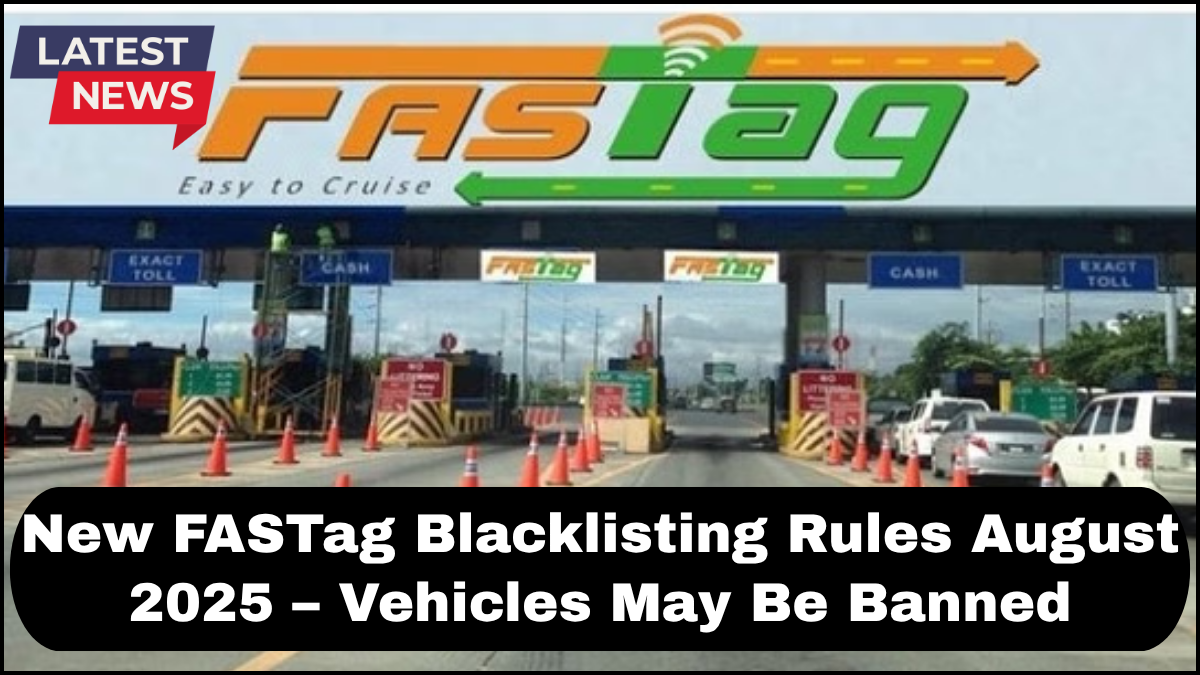The National Highway Authority of India (NHAI) has rolled out a significant update to the FASTag blacklisting rules starting August 2025. These changes are part of a broader push to streamline toll collection, reduce traffic bottlenecks, and enforce compliance more strictly. One major consequence of this new framework: vehicles with non-compliant FASTags may now face outright bans from entering toll plazas across the country.

This FASTag Blacklisting Rules Update is not just a minor tweak—it represents a serious escalation in the government’s efforts to ensure electronic toll systems operate smoothly and fairly. Here’s everything you need to know.
What Has Changed in the New FASTag Blacklisting Rules?
Under the revised rules, FASTags can now be blacklisted instantly under several new conditions that didn’t previously trigger penalties. This move comes in response to growing misuse, including repeated failed payments, fake recharges, and incorrect account details.
Key changes include:
-
Zero Balance FASTags Will Be Deactivated: Any FASTag that shows insufficient balance more than twice in a 30-day period will be automatically blacklisted.
-
Invalid KYC Leads to Deactivation: Incomplete or fraudulent Know Your Customer (KYC) details will now result in immediate blacklisting.
-
Vehicle Mismatch Detection: If the FASTag is detected on a different vehicle than registered, it will trigger blacklisting and a penalty.
-
Bank Integration Checks: Tags not linked correctly with issuing banks may also be auto-disabled until resolved.
These changes aim to improve compliance and make it harder for users to game the system or delay toll payments.
Implications of FASTag Blacklisting: Vehicle Ban Policy in Effect
With this new enforcement, the government has added a vehicle ban policy that bars blacklisted vehicles from toll plaza entry altogether. This could lead to:
-
Denial of Toll Access: Blacklisted FASTags will trigger boom barriers to remain shut, preventing physical passage.
-
Fines for Non-Compliance: Some states may begin issuing fines to vehicle owners whose FASTags remain blacklisted for extended periods.
-
Towing or Detention: In high-traffic or sensitive zones, repeated non-compliance could lead to vehicle towing or temporary impoundment.
The aim here is deterrence: make ignoring FASTag rules too costly to risk.
Why This Update Matters for Every Vehicle Owner
The FASTag Blacklisting Rules Update is not just for commercial fleets or highway regulars. It affects every private car, two-wheeler, and commercial vehicle using toll roads. Since FASTag has been made mandatory for national highways, failing to keep your tag compliant now has real-world consequences beyond just minor delays.
Real-world example:
A commuter traveling daily from Noida to Delhi via the DND Flyway experienced multiple rejections at the toll due to his bank auto-recharge system failing. Under the new rules, his FASTag would be blacklisted after just two failed attempts in a month—barring him from access until the issue is resolved and reinstated manually.
How to Avoid FASTag Blacklisting
To stay on the right side of the new regulations, vehicle owners should:
-
Ensure Sufficient Balance: Keep your FASTag wallet topped up, especially if you travel frequently.
-
Verify KYC Details: Check your issuing bank’s FASTag portal to ensure all documents are correctly uploaded and validated.
-
Match Vehicle and Tag: Never use a FASTag registered for one vehicle on another.
-
Enable Notifications: Activate SMS or app alerts to monitor failed transactions or low balances.
Simple vigilance can help you avoid the stress and hassle of sudden travel disruptions.
What Banks and Toll Authorities Are Doing
Banks that issue FASTags are now required to send real-time warnings before a tag is blacklisted. Some have already started offering:
-
Auto top-up options linked to user accounts
-
App notifications and SMS alerts
-
Dedicated helplines for FASTag resolution
Meanwhile, NHAI is integrating a centralized blacklist database across all toll plazas so that a blacklisted vehicle is denied entry at every toll booth across India.
FASTag and the Future of Highway Monitoring
These rules are part of India’s vision to implement an AI-driven, cashless toll ecosystem. FASTag is already being linked to vehicle insurance, pollution certificates, and now even driving behavior data. The current blacklisting rules may be a prelude to a broader intelligent transport policy that dynamically monitors and rewards compliant drivers.
Frequently Asked Questions (FAQ)
Q1: What does it mean if my FASTag is blacklisted?
A: It means your tag has been disabled and can no longer be used for toll payments. Your vehicle may be denied access to toll roads until the issue is resolved.
Q2: How can I check if my FASTag is blacklisted?
A: Visit your issuing bank’s FASTag portal or use the NHAI FASTag app to check status and get alerts.
Q3: What if my FASTag was wrongly blacklisted?
A: You can file a dispute with your issuing bank or contact NHAI customer service. Most cases are resolved within 24–48 hours.
Q4: Is FASTag mandatory for all vehicles in India?
A: Yes, FASTag is mandatory for all four-wheelers and above on national highways.
Q5: Can a vehicle be banned permanently under this policy?
A: While permanent bans are rare, repeated violations could lead to long-term restrictions or added penalties.
click here to learn more